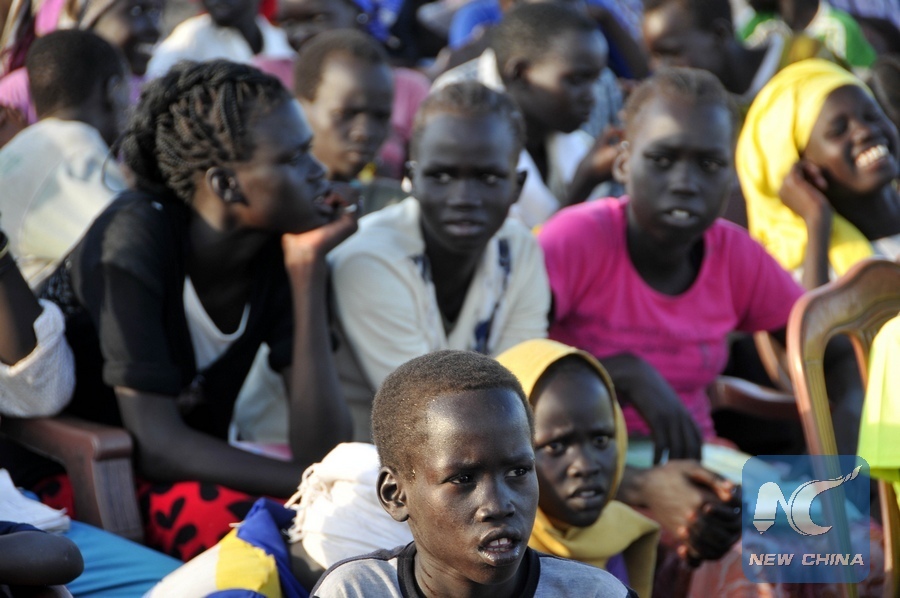
Refugees from South Sudan rest at a refugee camp in Sudan's White Nile state near the border with South Sudan on May 17, 2017. The Sudanese Red Crescent Society (SRCS) on Tuesday said it is about to launch an urgent relief appeal to meet the growing influx of refugees from South Sudan. (Xinhua/Mohamed Babiker)
ADDIS ABABA, Feb. 7 (Xinhua) -- When peace talks resumed early this week in Ethiopia's capital Addis Ababa to end South Sudan's brutal civil war, it was with a warning the talks could be the last chance to salvage peace.
The Addis Ababa peace talks called "Second Phase of High-Level Revitalization Forum" came after the December 24, 2017 ceasefire agreement in which warring parties signed a Cessation of Hostilities Agreement. The deal was broken hours after its enforcement was supposed to start.
IGAD Council of Ministers Chairman, Workneh Gebeyehu, told the warring parities and stakeholders at the beginning of the 10-day peace talks that "this is your last chance." South Sudan is a member nation of the eight-nations East African bloc IGAD.
Gebeyehu, who is also Ethiopia's foreign minister, said after the cessation of hostilities agreement was signed last December there had been multiple reports of violations.
Already, heads of the UN, AU and IGAD had during the 30th AU summit last month jointly voiced their frustrations and warned South Sudan's warring factions against violating the recent peace deal.
With exasperation reaching boiling point among mediators and donor nations with inability of South Sudanese warring parties to end the civil war, some have taken unilateral punitive stances.
Earlier this month, the U.S. imposed arms embargo on South Sudan ,while the EU imposed travel bans and asset freezes on three current and former South Sudan officials.
With South Sudan's civil war that has killed thousands and displaced millions entering its fifth year without an end in sight, analysts say the international community especially neighboring countries can't afford to abandon the world's newest nation.
Abebe Aynete, senior researcher at the Ethiopian Foreign Relations Strategic Studies, a local think thank, told Xinhua what will most likely happen in 2018 is IGAD and its individual member nations could slap targeted sanctions on individuals suspected of fueling the conflict.
Ethiopia, an influential South Sudan neighbor, currently shelters around half a million South Sudanese refugees and has hosted several rounds of peace talks ever since the South Sudan civil war erupted in December 2013.
Aynete painted a pessimistic picture in 2018 for South Sudan, saying the much-awaited 2018 election that was supposed to solve the country's bitter division is unlikely to happen.
South Sudan has not had democratic elections since it won independence from Sudan in 2011 after more than two decades of civil war that ended with President Salva Kiir ascending to power through referendum vote, ushering in a transition period in the oil-rich and yet impoverished country.
It descended into violence starting December 2013 after a political dispute between President Salva Kiir and his former deputy turned rebel chief Riek Machar led to split in the army, leaving soldiers to fight alongside ethnic lines.
The conflict has since then fragmented with shifting alliances and a fractured armed opposition making it harder for mediators to bring all sides to the negotiating table.
James Morgan, South Sudan's ambassador to Ethiopia, told Xinhua that mediators and donor nations need to have full picture to resolve the conflict instead of threatening punitive measures.
"There are elements in the rebellion not interested in cessation of hostilities, the body tasked with monitoring ceasefire doesn't have the capacity to monitor," he said.
Morgan was referring to a Ceasefire and Transitional Security Arrangements Monitoring Mechanism established by IGAD to investigate and report on cease fire violations among its tasks.
The ambassador was also defiant to threat of further sanctions especially being made by western nations out of "own self-interest and ego".
With the U.S. and EU starting to impose sanctions and IGAD warning it could take a range of political measures on violators and spoilers of South Sudan peace process, others are advising a more cautious approach.
Speaking exclusively to Xinhua, Chinese ambassador to South Sudan He Xiangdong said on Monday the conflict in South Sudan may seem difficult to resolve, but every effort must be made to find sustainable solution.
"I think on punitive matters we need to further consultation with IGAD countries and AU. Definitely, a certain kind of pressure is needed to push the peace process to move forward, while at the same time be cautious of results of all the possible measures, because we need to put result first. Any measure needs to be carefully calculated to see if it's helpful to resolve the problems or not," said the ambassador.
?

